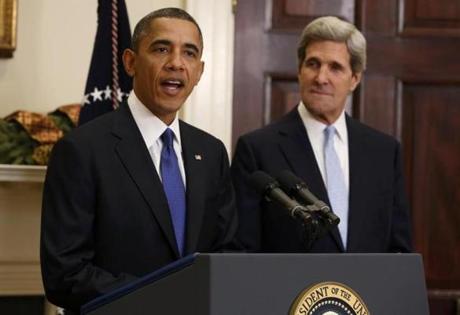
Credit: Kevin Lamarque/Reuters
A persistent question has emerged among pundits of the Arab-Israeli conflict over the past few weeks: Now that the Kerry-driven peace process has come to an end with no tangible results, what will the United States do? What does the Obama Administration intend to do in the next two and a half years vis-a-vis the conflict? The following presents four possible scenarios.
1) A compelling interview of a senior American official (who requested to remain anonymous) was recently published in the Israeli newspaper Haaretz. The American official told Haaretz that Obama intends to let the Israeli and Palestinian leaderships “stew in their own juices” for the time being. President Obama reportedly hopes that after a “few months” of no negotiations and mitigated American involvement, Abbas and Netanyahu will realize that that they both have a considerable interest in pursuing substantive peace talks. In the words of the American official: “For now we are letting the parties confront the new reality…we hope they realize the [consequences of] failure will be more difficult in the long run than success.” The official made it clear that America is ready and willing to facilitate any new dialogue between Israeli and Palestinian leaders, but that President Obama is not interested in attempting to jumpstart a process that neither side shows a real sense of urgency in pursuing.
2) The first scenario presented above has a major problem: The American official is only speaking about the short-term. What happens if those “few months” come to an end and the Palestinians and Israelis still have not expressed a sincere desire to negotiate and reach an agreement? The article points to Obama’s sense of resignation about the whole issue, and this could dictate what happens. America could simply let the conflict simmer on, realizing that there is nothing that it can do single-handedly to substantively change its dynamics. Obama will leave the conflict to his successor.
3) The previous two scenarios completely disregard Palestinian and Israeli agency. Just as America does not wave a magic wand that makes Arab-Israeli peace, it cannot wave a magic wand that maintains its desired level of (un)involvement. Israeli and Palestinian actions — and the chain reactions they may put in place — will immensely influence Washington’s policies towards the Arab-Israeli conflict over the next couple of years. There are innumerable situations that could emerge: a Third Intifada, another Hezbollah-Israel war, another Hamas-Israel war, or simply a particularly violent incident to which America must respond to name just several. Any of these may be what overwhelmingly influences the character of Israeli-U.S. relations over the next couple of years.
On the one hand, there is a chance that Palestinian violence and violence from the wider Arab world will propel the Obama Administration to condemnations the attacks against Israel, which in turn would let Israel off the hook on peace issues. On the other hand, there is also a reasonable chance that what Washington may see as Israeli overreactions to Palestinian and Arab provocations will force the Obama Administration to point its finger at Israel, leaving the American-Israeli relationship at the end of Obama’s presidency in a rocky place.
4) In tandem with with number three, a significant change in the composition of the leaderships on either side could play a major factor in determining the next couple of years of the American-Israeli relationship. First, elections on either side could significantly change the American-Israeli relationship over the next couple of years. While Netanyahu does seem to be the infallible Israeli leader at the moment, every prime minister’s run does come to an end eventually. If new Israeli elections bring a more flexible government into office, perhaps even with Netanyahu still at its head, America may determine that Israel has met the level of seriousness needed to pursue a deal — and re-engage.
Furthermore, the outcome of the Hamas-Fatah unity deal — if it is actually implemented — may also spur a significant American reaction. The preliminary deal reached between Fatah and Hamas calls for Palestinian elections. If they actually do come to fruition, the results could determine America’s policy towards Israel: If Fatah wins resoundingly and a new Palestinian government is created in which Fatah overwhelmingly predominates and the new Palestinian president clearly expresses his desire to live in peace and harmony with Israel under the rubric of a two-state solution, one can predict that the Obama Administration may turn up the pressure on Israel to do something in return. If, on the other hand, Hamas wins or becomes a substantive and potent part of the new Palestinian government, one can assume that the Obama Administration will not pressure Israel to make any moves towards peace.
Regardless of which, if any, of the above directions American-Israeli relations move towards during the remainder of Barack Obama’s presidency, one thing remains certain: American military aid to Israel will continue at the same, or higher, levels. It has been Obama’s belief since early in his presidency that Israel will not be moved to make concessions for peace unless it first feels a sense of security. He understands the vulnerability that Israelis feel and how American support can help allay those fears. As he poignantly re-assured the crowd during his speech in Israel a year ago, “Atem lo levad” (you are not alone). Martin Indyk, the American official who was made America’s Special Envoy for Israeli-Palestinian Negotiations, echoed this sentiment during a recent speech at the Washington Institute for Near East Policy: “President Obama and Secretary Kerry would never suspend U.S.-Israel military relations as their predecessors did back then [during the Ford Administration, under then-Secretary of State Henry Kissinger]. Those military relations are too important to both our nations.”